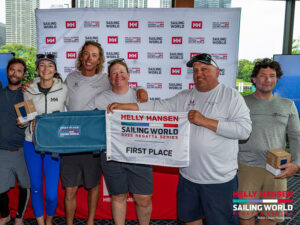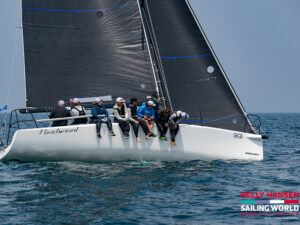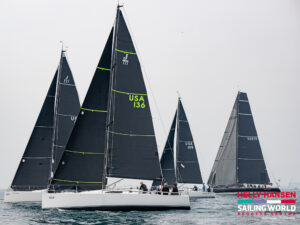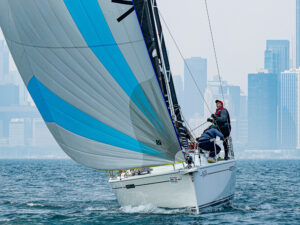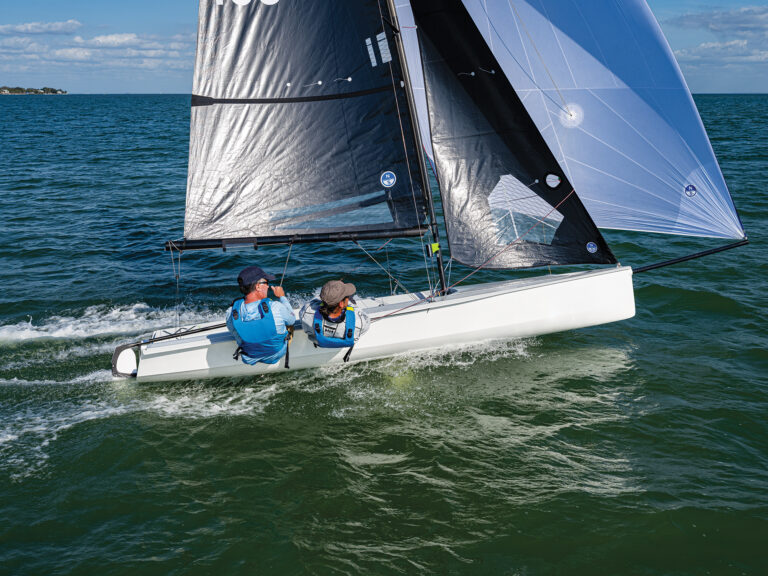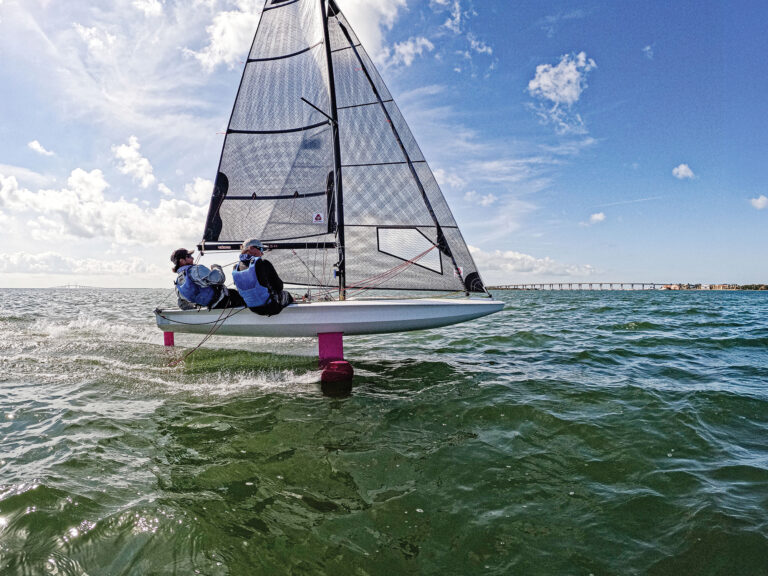
Trononto Day 1
Things weren’t looking too promising when the fleet of 134 competitors motored out onto Lake Ontario this morning for the first day of racing at the Lands’ End Toronto NOOD Regatta. When the lake descended into a glassy sea, void of any wind, things looked even worse. But Toronto sailors are a patient bunch, and they knew full well something would come from aloft, and come it did with a southerly filled with holes and patches, just enough to get the regatta rolling. After it was all said and done, three of four circles completed one race, and closer to shore, the regattas smallest boats-the 2.4 Meters-racked up four. “It was all about going left, as they say you’re supposed to do here,” says Paul Tingley, a disabled sailor from Halifax, Nova Scotia, who’s tied for first with division leader Allan Liebel, of Toronto. “But the racing was tight; the standings are all mixed up.” Tingley had 4-4-1-2 finishes in the 12-boat fleet to Leibel’s steadily improving 5-3-2-1. Bruce Millar, a Canadian Paralympic sailor, and Roger Cleworth, each won a race, creating a 5-point spread among the top four boats. In winning today’s only race in the nine-boat J/35 division, Roger Walker’s Battlewagon, from Toronto, used everything in its back of tricks to come from behind, and demonstrated how well honed this all-amateur team is. “We’ve sailed together for six years as a group,” says Walker, “and I can’t say enough about how awesome they are.” By example, Walker says they had a bad start (“My fault entirely”) and were fourth at one point. On the final run to the finish, they were between the leading two boats. Using a few “code” words onboard, Battlewagon quickly jibed, catching its competitors off guard, and passing them both. “I know they were waiting for us to jibe, and if they jibed first they would have had us,” says Walker, “but our jibe was perfect, and that’s where the crewwork comes in.” Taking the guesswork out of the day’s fickle breezes was another key element of the day says Jeff Maludy, who’s Mumm 30 Adrenaline, from Toledo, Ohio, leads its eight-boat division. But so, too, is following a few basic light-air principles. “That means having a clean start, clear air, and getting to the first shift.” In his only start of the day, Maludy and his crew saw the majority of Mumm 30s piling up and “fighting with each other,” heading towards the pin end of the starting line. Despite the left side of the course being favored, he started well to windward of the pack, virtually alone, with a head of steam, and “footed over everyone.” “I call myself an opportunistic starter,” says Maludy. “What I mean by that is I plan a general start depending on the line sight and all that, but I also closely watch the committee boat and its flag. The committee boat turns slow, so that’s the old wind; the flag is the new wind. In the final minute and a half, I used this to determine the phase the wind is in. Getting that last shift it important.” Maludy’s analytical approach may have won him his race, but for others, particularly Judy Button’s Laser 28 Rags, from Mississgau, Ontario, sometimes luck is all that’s required. “I’m definitely more of a seat-of-the pants sailors,” says Button, who leads the seven-boat Level 126 class, one of four level-rated classes at the regatta. “We knew the pin end was favored, and we got forced out to the left at the start. Apparently the left side paid off. Other than that, I didn’t see much of what was happening on the racecourse-I just watch the telltales.” Racing resumes tomorrow morning and continues through Sunday. For today’s results from the Shark, 8 Meter, Beneteau 36.7, Mumm 30, J/24, C&C 27, J/105, C&C 34, and C&C 39 divisions

